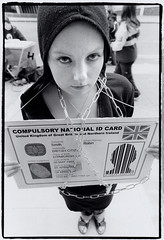Over the past 10 years, we’ve developed an obscene obsession with “identity,” and for all the wrong reasons.
 At every turn it seems like there are more requirements for “proof of identity,” or requests for ID. Somehow we’ve gotten it into our collective consciousness that being sure of someone’s identity removes all risk of fraud, theft, or crime – but nothing could be further from the truth. In fact, stricter requirements for “proof of identity” are, largely, a complete and utter waste of everyone’s time.
At every turn it seems like there are more requirements for “proof of identity,” or requests for ID. Somehow we’ve gotten it into our collective consciousness that being sure of someone’s identity removes all risk of fraud, theft, or crime – but nothing could be further from the truth. In fact, stricter requirements for “proof of identity” are, largely, a complete and utter waste of everyone’s time.
Consider this example: the state where I currently live (New Jersey) has an insanely complicated “6 point system” for getting (or even renewing!) a driver’s license. (This is due, at least in part, to the stupid REAL ID Act, which I’ve written about before.) You need “6 points” worth of identification, with different forms of identification being given different point values. For example, a passport is worth 4 points, but a drivers license from any other state is only worth 1 point. And it’s not enough to just get the 6 points you need – you have to have at least one document from each of several categories! And as if that’s not enough, you need another separate document “proving” that you are a resident, which gives you no points, but you need it anyway.
This obsession with “proving identity” seems to stem from the misguided belief that knowing who someone is gives you some insight into what their intentions are. This is obviously a fallacy. So too is the idea that somehow people with sinister intentions would be unable to prove their identity (because all “bad guys” have fake names and use fake IDs, right?). Although a 5th grader would probably understand all of the holes in this logic, somehow this has become our de-facto operating principle at both the large corporation and government level.
Part of this, I think, stems from CYA syndrome, otherwise known as “cover your ass” syndrome.
You see, by forcing everyone to prove who they are, you do establish some sort of paper trail that can be useful after the fact in solving crimes that have already happened. But this is a very small benefit for a hugely cumbersome system of identity verification and re-verification.
It is somewhat of a tangent, but on a personal level I find this constant need to “prove” that I am who I say I am very insulting. This constant doubt of your sincerity and trustworthiness is, frankly, wearisome.
While it’s true that there are some holes in the systems we use for identification, our obsession with identity hasn’t really addressed these concerns in any meaningful way. People continue to get fake IDs, and those who wish to commit crimes (or perpetrate acts of terrorism) will do so, regardless of whether they were able to get a driver’s license or not. So in the end, this obsession with ID is really, truthfully, and honestly a complete waste of time.
You trust me on that, right?
Photo “ID Card” by Gareth Harper, used under the terms of the Creative Commons Attribution-NonCommercial-ShareAlike license.
It’s like the laws that require women to prove every single change of name they have ever had – in my state, if you fail to prove all of your name changes, they will put your ID back in your maiden name.
My mother, for example: married briefly when she was 18. Widowed. This was 47 years ago, but she is expected to produce the marriage certificate AND her late husband’s death certificate.
I could understand making her prove her current marriage, but she has to produce marriage, divorce, and death certificates for EVERY marriage – even though she hasn’t used her previous married names in 30 years. Why should she have to prove all of them, if the only one she uses is the current one? It’s absurd.
That IS absurd, although it sounds more like an archaic holdover from when people didn’t live as long as they do now (or get re-married/change their names as much as they do now). Still, it’s an archaic sounding law/rule and it really seems like someone aught to change that to “get with the times” or something.